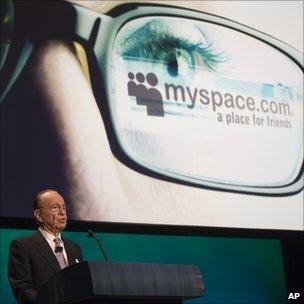MySpace sale offers tough lessons in social networking
- Published
- comments

News Corp paid $580m (£361m) for MySpace in 2005
The sale of MySpace is a sobering reminder that even in bubble times, social networking is not always the road to riches.
The site, bought by Rupert Murdoch's News Corp for an eye watering $580 million in 2005, looked like a bargain a couple of years later as it became the favoured web hangout of what was briefly the MySpace generation. Then they and many millions of new networkers moved to Facebook.
Now after a painful couple of years of decline and disillusionment, which has seen the founders depart and various turnaround plans come to nothing, News Corp has finally offloaded its unwanted baby for just $35 million.
Two lessons are being drawn - success in social networking is an ephemeral business and the owners of Facebook, LinkedIn and Twitter should get out now while the going is good.
And that the whole MySpace deal was another web disaster for Rupert Murdoch. Both conclusions strike me as wide of the mark.
If you look back through the history of social networking (why not try this radio series by the way?) you will see MySpace as just one chapter in the evolution of the idea - and in retrospect it looks like a diversion.
A business founded by people from the entertainment industry, rather than the geeks who started Facebook or Twitter, ended up struggling to make its technology work as it grew.
Then there was the decision to make it a place where users were anonymous, and could assume any identity they fancied. That worked at first, but when your real friends with their real names started popping up on Facebook, millions decided that was a better way to network.
'Social adventure'
After the tumult of the early years, when the likes of Friendster, Friends Reunited and MySpace, thrived then faded, things seem to have settled down.
The world has chosen Facebook, but the likes of LinkedIn and Twitter are offering bespoke services - fast news or business networking - which appeal to smaller communities. What MySpace has become is a platform for musicians and music fans - and strangely, if it had come along now, it might have had a better chance of making it as a niche network.
Someone suggested to me this morning that MySpace's mistake had been to commercialise too much - and that Twitter and Facebook should learn from that.
Well, nobody could accuse either network of striving too hard too early to make money - indeed quite the opposite.
But was MySpace's problem that its owners News Corp were too eager to cash in?
Sure, after their purchase in 2005, external, very early in MySpace's life, the new owners were quick to see that advertising would be the basis of the business model. Within a year, a $900m deal with Google, external to place ads on the site had more than covered the cost of the acquisition.
But did the adverts drive MySpace users away? I don't think so - after all the big migration started happening in 2008 and 2009, way after the commercialisation had begun - and by that time even Facebook was moving to monetise its users.
And did Rupert Murdoch get it so badly wrong? He was right to think in 2005 that social networking was the next big thing.
He was right to strike a deal with Google which not only covered his costs but showed the advertising industry where its online future might lie.
But maybe for once he was not ruthless enough - by the time the founders departed, the battle with Facebook was already lost.
And Mr Murdoch can comfort himself by reflecting that if his social adventure ended badly, another media giant fared much worse.
Back in 2008 AOL bought Bebo for $850 million, external, then sold it a couple of years on for less than $10 million. Now that's how to get it wrong....